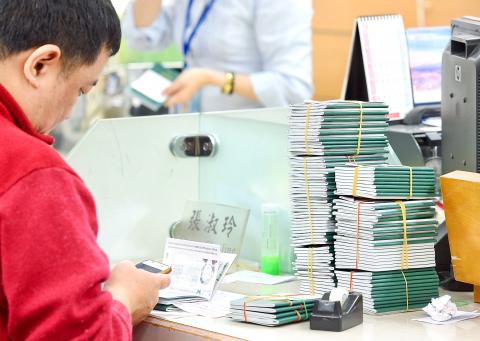There should be no technical obstacles to adding a third gender option to passports as long as the Ministry of the Interior approves such an option for household registration and national identification purposes, the Ministry of Foreign Affairs said yesterday.
The issuance of passports is conditional on the issuance of national identification cards, so if the interior ministry decides to include a third gender option, the foreign ministry would make the same change to passports, foreign ministry spokesman Andrew Lee (李憲章) said at a news conference.
Several countries have introduced an “X” — “unspecified” — gender option on passports, including Canada, Australia, New Zealand, Malta, Nepal and Denmark, according to the International Civil Aviation Organization (ICAO).

Photo: Peter Lo, Taipei Times
If the government were to make new policy on the matter, the Department of Household Registration would make changes as required, department Director Chang Wan-yi (張琬宜) said.
The Executive Yuan’s Gender Equality Committee yesterday said it is working to introduce a third gender option on identity documents to protect the rights of transgender, intersex and other gender-diverse individuals.
The government has decided to add a third gender option, the committee said, adding that it is checking related laws, regulations and forms and would convene a cross-agency meeting to discuss specifics as soon as possible.
The policy involves several agencies and the committee predicts that multiple discussions would need to be held, it said.
In September last year, Minister Without Portfolio Lin Wan-I (林萬億) convened a meeting and instructed agencies to check laws, regulations and forms, the committee said.
Minister without Portfolio Lo Ping-cheng (羅秉成) is now responsible for supervising the preparatory work, it said.
After the examination, Lo is to convene a cross-agency meeting to discuss specifics and the short, medium and long-term goals of the policy, it added.
Further discussions are needed to decide on a timetable for the policy, the committee said.

The High Prosecutors’ Office yesterday withdrew an appeal against the acquittal of a former bank manager 22 years after his death, marking Taiwan’s first instance of prosecutors rendering posthumous justice to a wrongfully convicted defendant. Chu Ching-en (諸慶恩) — formerly a manager at the Taipei branch of BNP Paribas — was in 1999 accused by Weng Mao-chung (翁茂鍾), then-president of Chia Her Industrial Co, of forging a request for a fixed deposit of US$10 million by I-Hwa Industrial Co, a subsidiary of Chia Her, which was used as collateral. Chu was ruled not guilty in the first trial, but was found guilty

DEADLOCK: As the commission is unable to forum a quorum to review license renewal applications, the channel operators are not at fault and can air past their license date The National Communications Commission (NCC) yesterday said that the Public Television Service (PTS) and 36 other television and radio broadcasters could continue airing, despite the commission’s inability to meet a quorum to review their license renewal applications. The licenses of PTS and the other channels are set to expire between this month and June. The National Communications Commission Organization Act (國家通訊傳播委員會組織法) stipulates that the commission must meet the mandated quorum of four to hold a valid meeting. The seven-member commission currently has only three commissioners. “We have informed the channel operators of the progress we have made in reviewing their license renewal applications, and

Taiwan People’s Party (TPP) Chairman Huang Kuo-chang (黃國昌) yesterday appealed to the authorities to release former Taipei mayor Ko Wen-je (柯文哲) from pretrial detention amid conflicting reports about his health. The TPP at a news conference on Thursday said that Ko should be released to a hospital for treatment, adding that he has blood in his urine and had spells of pain and nausea followed by vomiting over the past three months. Hsieh Yen-yau (謝炎堯), a retired professor of internal medicine and Ko’s former teacher, said that Ko’s symptoms aligned with gallstones, kidney inflammation and potentially dangerous heart conditions. Ko, charged with

Taiwan-based publisher Li Yanhe (李延賀) has been sentenced to three years in prison, fined 50,000 yuan (US$6,890) in personal assets and deprived political rights for one year for “inciting secession” in China, China's Taiwan Affairs Office spokesman Chen Binhua (陳斌華) said today. The Shanghai First Intermediate People’s Court announced the verdict on Feb. 17, Chen said. The trial was conducted lawfully, and in an open and fair manner, he said, adding that the verdict has since come into legal effect. The defendant reportedly admitted guilt and would appeal within the statutory appeal period, he said, adding that the defendant and his family have